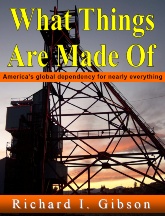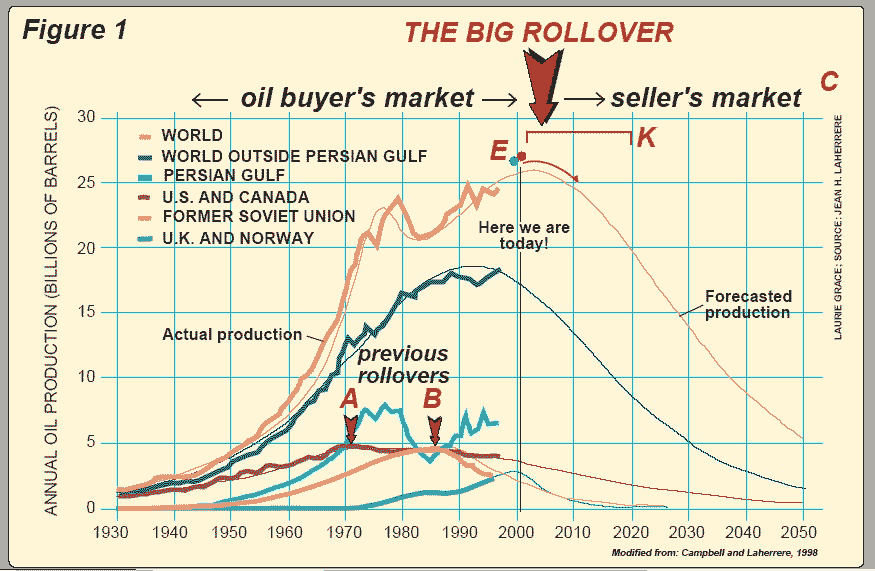
Some interesting oil industry statistics - Sustainability
©1997-2007 Gibson Consulting

 | By Richard Gibson:
What Things Are Made Of
The story of America's dependency
on mineral commodities (including oil) in everyday life.
Buy the book. Print (312 pages): $17.95; electronic (PDF) $9.99. Additional e-versions details to come.
visit the blog | Share this article
|
Support this page! |
See also this essay.
Q: Do you think our current usage of oil is sustainable?
A: Do you mean, can we in the US continue at current rates forever? Certainly not. Can we continue for 5 more years? Maybe, but the hugely surging demand in China, and soon in India, will likely make the US become no longer the world's primary customer for oil. That will mean that the exporting countries will no longer have the vested interest that they do today in our economy and in us remaining stable enough to continue to buy their product. They will begin to cater to China rather than to the US. That could happen within 5 years, who knows? China's gasoline consumption increased by something like 30% between 2002 and 2003, and shows no signs of stopping. They do have a long way to go to catch up with the US, but they are on the way. There will likely be enough oil for the US - but it will no longer be cheap. I refer you to the National Geographic article of a couple months ago, "The End of Cheap Oil." An even-handed treatment. But US consumption, at 27% of the world's oil production and 45% of its gasoline, is the lynchpin in the problem: we cannot blame China and assume no responsibility ourselve. The United States is the primary culprit.
If you mean is current usage in the world sustainable, certainly not, in any
kind of long run. Depending on who you listen to, the global peak of oil production
will be anywhere from 2005 to 2035. That is the time at which production + replacement
of reserves (i.e. new discoveries) will no longer be greater than demand. Prices
will surge. There will probably be oil till near the end of this century --
it will just be way too expensive to use for such wasteful things as fuel. Think
about plastic -- most of the 73 million tons of plastic produced in the US and Europe each year is made from hydrocarbons
(oil and gas). Increasingly, bioplastics from plants (information here) are being used in applications ranging from automotive plastics to computers and packaging, but to date the volumes amount to only a few hundred thousand tons per year.
 Q: I am doing a project for my Theory of Knowledge class and am
questioning whether there is any way of ensuring an energy source,
whether oil or something else, in the coming years. It seems as though
our rapid consumption of natural resources cannot last forever and at
some time in the near future something else will have to take it's
place. If you could give me some statistics on the amount of oil used
everyday, proposed amount of time our current supplies will last, and if
there is any advancements in alternate energy I would appreciate it greatly.
Q: I am doing a project for my Theory of Knowledge class and am
questioning whether there is any way of ensuring an energy source,
whether oil or something else, in the coming years. It seems as though
our rapid consumption of natural resources cannot last forever and at
some time in the near future something else will have to take it's
place. If you could give me some statistics on the amount of oil used
everyday, proposed amount of time our current supplies will last, and if
there is any advancements in alternate energy I would appreciate it greatly.
A: There is some information about world and US consumption on my oil page. You can find wildly varying estimates for the length of time we can still have oil -- look on the web for references to "global peak of production" -- some, the doomsayers, say that the peak of production will occur as soon as 2007. (See chart, above, from USGS Open-File Report 00-320, by L.B. Magoon) Others say it will more likely be in 2030-2040. In either case, this is not "running out", it is rather the time after which production will decline while (unless something happens) demand increases. There will then be high costs (much higher than today) and shortages, especially in places with high demand (like the US). A couple months ago National Geographic had an excellent article on "The end of cheap oil" - I recommend it for information such as you seek. Alternative energy sources are being studied, though not really aggressively - our addiction to the oil habit is far too strong right now.
To answer your initial question, "is any way of ensuring an energy source...",
the easy answer is no, there is absolutely NO way of ENSURING an energy source
in the next few years. If world economy could switch to completely renewable
resources, such as solar, wind, geothermal, and hydropower, then yes -- but
that is not likely to happen anytime soon - like decades. Iceland is the only
country that gets 100% of its electric and heating from geothermal and hydropower
sources. In contrast, the US gets about 4% from these sources. That cannot change
overnight, or even over several years. It can only change through major technology
changes plus changes in lifestyle, meaning energy conservation -- and I would
not hold my breath on tható even with gasoline at $2.00 per gallon, US consumers
absolutely refuse to conserve or change their lifestyles significantly. Even
if we did, the burgeoning demand in places like China will likely soon displace
the US as the most important market - so that the oil producers will no longer
cater to our needs, as they do today. Energy is not really the problem; liquid fuel is.
Compiled by Dick Gibson, Gibson Consulting, 301 N. Crystal St., Butte, MT 59701
Want to know more?
Gibson Consulting recommends: Read The Prize, by Daniel Yergin. |


©1997-2009 Gibson Consulting
Background image of drilling well in Utah in 1981 © 2000 by Dick Gibson



 Q: I am doing a project for my Theory of Knowledge class and am
questioning whether there is any way of ensuring an energy source,
whether oil or something else, in the coming years. It seems as though
our rapid consumption of natural resources cannot last forever and at
some time in the near future something else will have to take it's
place. If you could give me some statistics on the amount of oil used
everyday, proposed amount of time our current supplies will last, and if
there is any advancements in alternate energy I would appreciate it greatly.
Q: I am doing a project for my Theory of Knowledge class and am
questioning whether there is any way of ensuring an energy source,
whether oil or something else, in the coming years. It seems as though
our rapid consumption of natural resources cannot last forever and at
some time in the near future something else will have to take it's
place. If you could give me some statistics on the amount of oil used
everyday, proposed amount of time our current supplies will last, and if
there is any advancements in alternate energy I would appreciate it greatly.